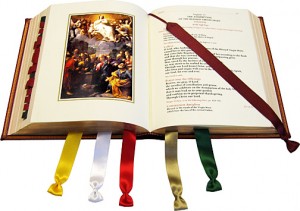 [1]Catholics are very familiar with the parts of the Mass—perhaps too familiar. Sunday after Sunday, we recite certain words such as, “Amen…Thanks be to God…Alleluia…Holy, Holy, Holy Lord….” These words are so ingrained that we often say them robotically, out of simple routine. Indeed, if someone poked us in the middle of the night and said, “The Lord be with you,” many of us would probably respond instinctively, “And also with you.”
[1]Catholics are very familiar with the parts of the Mass—perhaps too familiar. Sunday after Sunday, we recite certain words such as, “Amen…Thanks be to God…Alleluia…Holy, Holy, Holy Lord….” These words are so ingrained that we often say them robotically, out of simple routine. Indeed, if someone poked us in the middle of the night and said, “The Lord be with you,” many of us would probably respond instinctively, “And also with you.”
But do we really grasp the meaning of these words? Do we understand the significance of what we are doing and saying in the Liturgy?
The new English translation of the Mass, which will begin the last Sunday of November, provides a unique opportunity for Catholics to prayerfully reflect on the Liturgy. The updated translation brings about the most significant change in the way most English-speaking Catholics participate in the Mass since the years following the Second Vatican Council (1962–1965), when the liturgical texts were translated from Latin.
The basic structure of the prayers will remain the same, but the changes in wording at many points throughout the liturgy will be quite noticeable. For a time, most Catholics will no longer be able to stroll into church and automatically recite the Gloria, the Nicene Creed, and other responses. They will need a guide to help them become accustomed to the new translation of these prayers.
As we are taken out of our routine, we will have the opportunity to ponder the significance of all that we say and do in the liturgy, thus re rediscovering the mysterious splendor of Catholic worship.
For example, consider the meaning of the most noticeable changes found near the opening of Mass. It involves the people’s response to the priest’s greeting, “The Lord be with you.” In the new translation, the congregation will reply, “And with your spirit.” This phrase more properly reflects the original Latin text and makes clearer the Scriptural allusion (cf. Galatians 6:18; Philippians 4:23; 2 Timothy 4:22).
It also makes a finer theological point. When we say, “And also with you,” one might get the impression that our response is merely intended to express an exchange of personal greetings: “May the Lord be with you, too, Father.”
But there is really much more to it. When a man is ordained a priest, the Holy Spirit comes upon him in a unique way, enabling him to perform the sacred rites of the Mass, especially the consecration the Eucharist. By responding, “And with your spirit,” we acknowledge the Spirit’s activity in and through the priest during the Liturgy. We are referring to the “spirit” of the priest, the very core of his being, which has been transformed by ordination. Indeed, we are acknowledging that while God works through the priest who is offering the Mass, ultimately it is Jesus Christ who is the head of the community gathered for the Liturgy, and it is the Spirit acting primarily in the Liturgy.
This is just one of many spiritual gems found in the new Mass translation.
This is the first part of an on-going series by Dr. Sri on the new English translation of the Roman Missal.